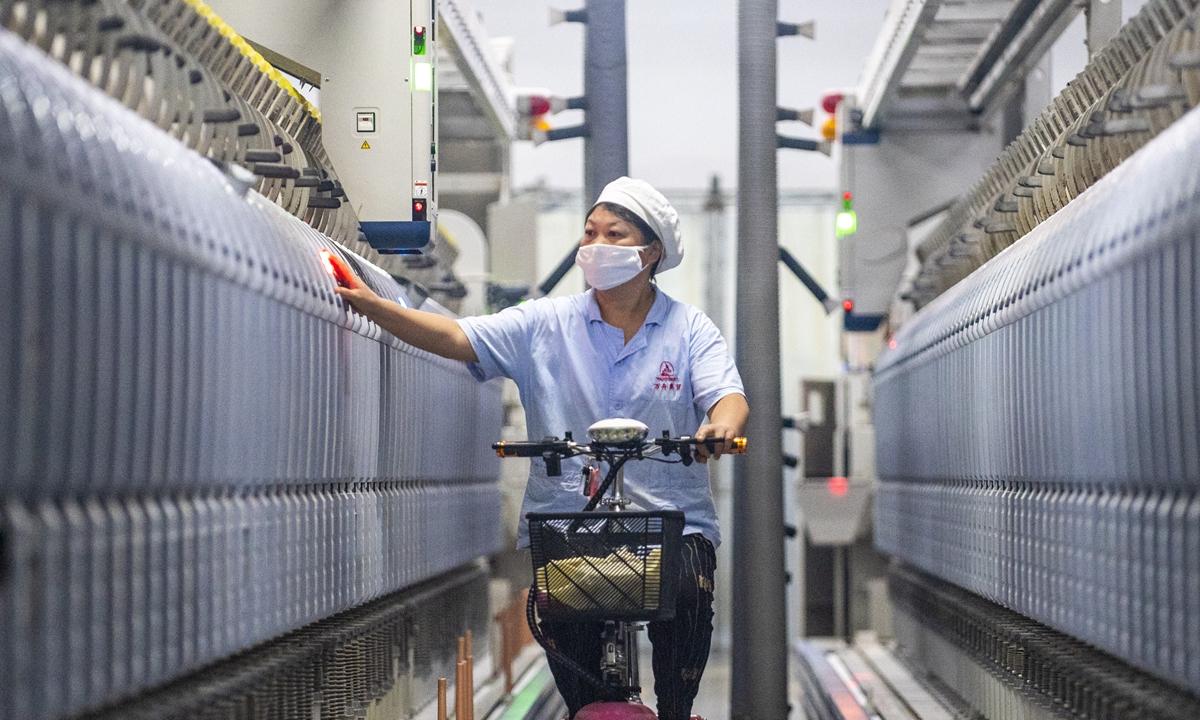China aims to beef up information industry, with digital design tools, high-tech equipment to be focused
Digital design tools, high-tech equipment to be focused

A worker checks sewing machines in a textile company in Lanxi, East China's Zhejiang Province on November 29, 2021. China has been making remarkable progress in expanding the application scenarios of the 5G+industrial internet sector, which has become an important driving force to empower the digitalization, networking and intelligent transformation and upgrading of domestic industries. Photo: cnsphoto
China plans to make advancements in major technological equipment manufacturing, as the country strives to integrate informationization and industrialization in the 14th Five-Year Plan (2021-25) period, the Ministry of Industry and Information Technology (MIIT) said in an action plan it released on Tuesday.
The document lists a number of specific objectives that China wants to achieve in terms of informationization-industrialization integration by the end of 2025. For example, China aims to achieve an 80 percent usage rate of digital tools across corporate management and operations by the end of 2025.
Also, 85 percent of research and development designing tools would be digitalized, while 68 percent of crucial production procedures should be digitally controlled, the document reads.
Tian Yun, deputy director of the Sino-Innovation Academy, said that China's progress in industrial informationization was among the fastest globally in the past few years, partly due to efforts to cut excess capacity and offset labor shortages.
"Many domestic private manufacturing companies have realized that they have to shift toward intelligent production, and they have included that requirement in their assessment standards," Tian told the Global Times.
The MIIT document noted that China achieved great success in enhancing traditional industries via informationization-industrialization integration during the 2016-20 period.
During those five years, the country's penetration rate for digital business management stood at 68.1 percent, increasing 13.2 percentage points. China opened more than one million 5G base stations during the period.

A concept photo of digital economy Photo: VCG
Tian forecasted that informationization will continue to speed up during the 2021-25 period, as structural changes in the labor force and the country's low-carbon targets will force domestic manufacturing industries to become more intelligent and refined. He also said that China's information industry might grow by 11 percent in the five years ending 2025.
According to the MIIT document, China will take many steps ranging from facilitating new products and business models to pushing digital transformation of the economy, to achieve its industrial informationization goals.
Officials will aim for major breakthroughs in the economy-wide use of technological equipment, as well as establishing digital workshops and intelligent factories for key equipment in industries like machinery, vehicle production, aerospace and electronics.
China will also make breakthroughs in key technologies such as artificial intelligence and blockchain, as well as electronic components, basic software and other technologies, the document noted.
Independent technology, media and telecommunications expert Fu Liang told the Global Times that China's "weak points" in equipment still arise from bottlenecks in certain technologies like chips, sensors and industrial modules.
But Fu said that when industry chains mature to a certain extent, it's certain that China's gap with overseas countries will narrow, as both government support and market demand will push companies to invest.
"Industrial informationization covers a very large scope of businesses, and any small company has the chance to grow into an industrial unicorn if it can make breakthroughs in technology. Therefore, it is a very alluring, opportunity-rich industry for domestic firms," Fu said.
Tian noted that since China has had success with products and technologies like plane engines and high-tech materials, he is confident of China's achieving further technical achievements with government-led input.
But the major problem lies in how those achievements can benefit manufacturing in general, he said.
"Automation is no longer a problem for many private manufacturing firms, but intelligentization still is, considering that many companies lack the software to collect and analyze information along their assembly lines. Besides, private firms are cautious about investing in the area, which is capital-intensive, and the business prospects are uncertain amid China-US wrestling," Tian said.
He suggested that manufacturing informationization can start with state-owned enterprises like steel and power companies, which have the resources and profits to launch informationization tests and can sell their solutions to private companies later.




